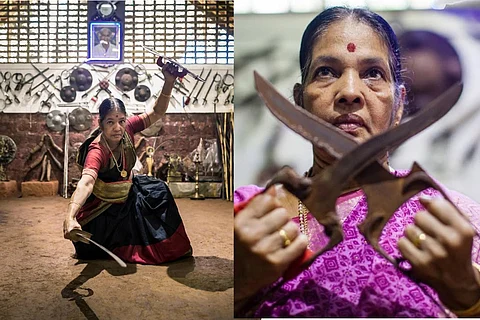
- HOMEGROWN WORLD
- #HGCREATORS
- #HGEXPLORE
- #HGVOICES
- #HGSHOP
- CAREERS
- ABOUT US
- CONTACT US

Honouring our cultural heritage is all about the preservation of our traditions. This is why your grandmother passes down the recipes her mother fed her growing up. It’s why we continue to play classical instruments and learn how to perform our oldest forms of dance. Food, music, and the visual and performing arts are what most quickly come to mind when we consider the pillars of our respective cultures. In Kerala, however, the martial art of Kalaripayattu, also referred to as simply 'Kalari' is treated with the same dignity as our other heritage treasures. One woman, in particular, has dedicated her life to maintaining not just a singular practice, but her communities way of life, through her conservation efforts.
Meenakshi Raghavan, lovingly called Meenakshi Amma by her community, is face of a movement to keep Kalari alive. Believed to be over 3000 years old, Kalari is India’s — and possibly the world’s — oldest martial art. Using a mixture of kicks, grappling, weaponry like double-sided swords, and meditative techniques, it’s clear that Kalari is about more than just fighting. Rooted in modern-day Kerala, it’s impact bleeds into the region’s social and cultural practices. In fact, Meenakshi Amma believes the martial art to be a transformative practice, influencing individual practitioners’ physical, mental, and spiritual health while also shaping their community’s rituals, arts, and way of life.
Meenakshi Amma started her journey with Kalari at just 7 years old and today, 75 years later, she spends her time passing her martial arts wisdom down to others as the head of the KACV Kalari Academy. This method of transferring knowledge from teacher, or guru, to student is also part of the Kalaripayattu tradition. On an etymological level, the word 'Kalaripayattu' combines 'kalari', meaning 'training ground', and 'payyatu', meaning 'practice' or 'fight'. The martial art is believed to have been introduced to the South by modern-day Kerala’s creator, Parashurama, who founded over 100 training camps where Kalari would be taught as a mode of self-defense. Beyond just the moves Meenakshi Amma teaches her students, the very act of her passing down knowledge is a continuation of her ancient history.
The physical strength and mental fortitude Kalari builds is especially important for Meenakshi Amma’s female students. The teacher told The Guardian that she believes Kalari is a source of empowerment for the young girls training under her, especially as they can now feel more confident in their ability to defend themselves in an environment that continues to be unsafe for women. Here, tradition is not just a continuation of the past but a tool for girls to use in their present and future.
If you enjoyed reading this, here’s more from Homegrown:
Inside A Neighbourhood In Meerut That Makes 95% Of India's Brass Instruments
9 Pioneering Indian Women Who Walked So Future Generations Could Run
5 Indian Women Who Are Proving That Sarees Belong Anywhere We Want Them To Be
